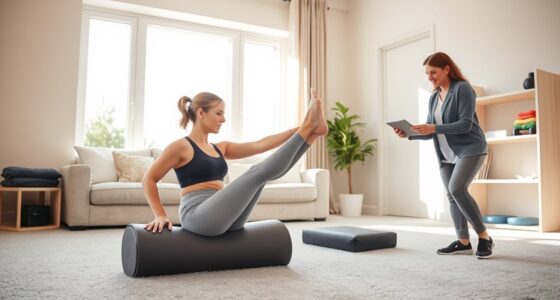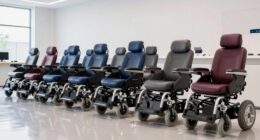To help a loved one with macular degeneration adapt at home, focus on creating a safe, clutter-free environment with wide doorways and sturdy handrails. Improve lighting using bright, even lights with high contrast, and incorporate task lighting where needed. Simplify daily routines by organizing essentials within reach and using high-contrast colors. Utilize assistive devices like magnifiers and voice-activated tools to boost independence. Offering emotional support and encouragement can also make a difference—learn more ways to assist them effectively.
Key Takeaways
- Improve home lighting with bright, even illumination and high-contrast features to enhance visual clarity.
- Organize the space to reduce clutter, create clear pathways, and place frequently used items within easy reach.
- Install sturdy handrails and use furniture with rounded edges to prevent falls and injuries.
- Incorporate assistive devices like magnifiers, talking clocks, and electronic organizers to support daily tasks.
- Offer emotional support, celebrate progress, and encourage hobbies to boost mood and overall well-being.
Creating a Safe and Accessible Living Space

Have you considered how your living space can be safer and more accessible for someone with macular degeneration? Simple changes can make a big difference. Remove clutter from walkways to prevent trips and falls. Use furniture with rounded edges to reduce injury risk. Ensure doorways and hallways are wide enough for mobility aids like walkers or canes. Install sturdy handrails along stairs and in bathrooms for extra support. Consider placing frequently used items within easy reach to avoid unnecessary stretching or bending. Clear pathways and organize belongings so they’re easy to find. Additionally, incorporating proper lighting can significantly improve visibility and reduce accidents. Utilizing innovative materials found in Nike Tech can inspire the creation of safer, more functional household items, enhancing safety and comfort. Employing sound design techniques, such as sound cues or alerts, can also help your loved one navigate their environment more confidently. Creating a supportive environment that encourages independence can further boost your loved one’s confidence at home. Choosing preppy dog names for a pet can also bring a sense of style and comfort to the home, enhancing the environment for your loved one. By creating a safer environment, you help your loved one maintain independence and confidence at home. Small adjustments can profoundly improve their safety and comfort, making daily life more manageable.
Enhancing Lighting and Visual Clarity
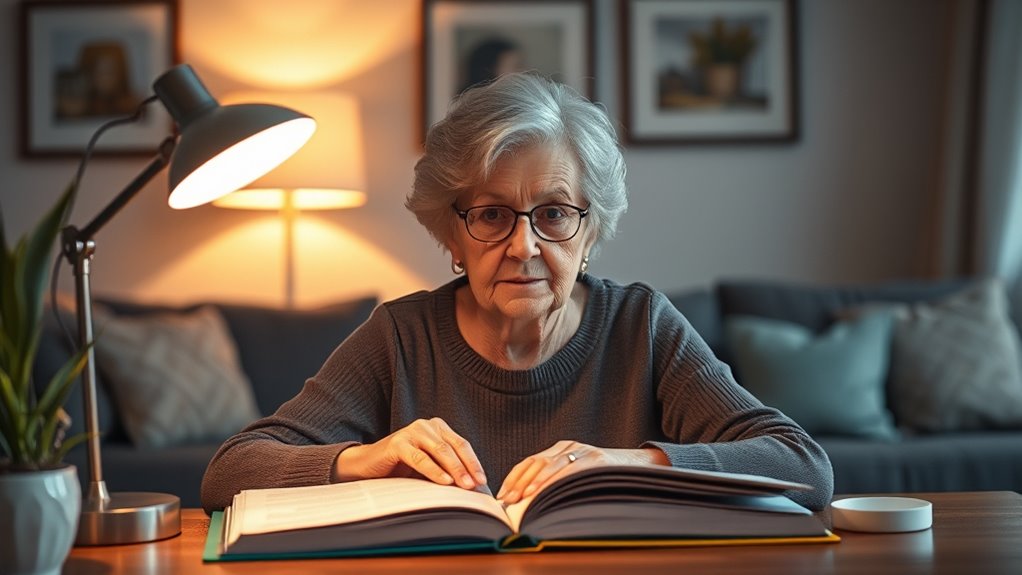
Improving lighting and visual clarity is essential for helping someone with macular degeneration navigate their environment safely. Bright, even lighting reduces shadows and glare that can cause confusion or accidents. Use multiple light sources to eliminate dark corners and ensure consistent illumination throughout rooms. Opt for task lighting in areas where detailed work occurs, like the kitchen or reading spots. Choose light bulbs with a high color rendering index (CRI) and a color temperature around 3000K to improve contrast and visibility. Avoid harsh or flickering lights, which can cause discomfort. Keep windows clean and use light-colored, matte surfaces to reflect light without creating glare. These adjustments help your loved one see more clearly, reducing falls and increasing confidence indoors. Additionally, incorporating appropriate lighting fixtures that distribute light evenly can further enhance overall visual clarity and safety. Being aware of lighting quality can make a significant difference in maintaining independence, especially as lighting conditions directly impact visual perception for those with macular degeneration. Furthermore, selecting lighting that minimizes glare can significantly reduce visual discomfort and improve overall safety. Properly designed lighting environments can also help reduce eye strain and fatigue, making daily activities easier.
Adapting Daily Activities and Routines
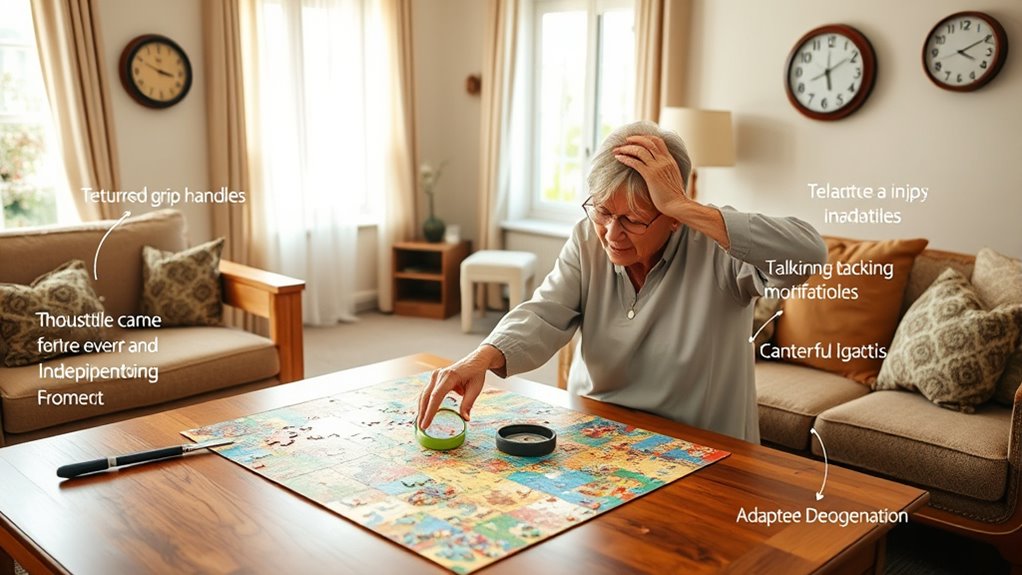
Adapting daily activities and routines is essential for maintaining independence and safety for someone with macular degeneration. Start by organizing your home to reduce clutter and create clear pathways, making navigation easier. Simplify tasks by breaking them into smaller steps and using high-contrast colors to distinguish items, such as placing a brightly colored dish towel near the sink. Adjust your schedule to prioritize important activities during times of better vision, like mornings. Use contrasting tape or markings on switches, handles, and appliances to improve visibility. Always confirm that frequently used items are within easy reach to prevent unnecessary stretching or bending. By making these adjustments, you help your loved one feel more confident and secure while maintaining their daily routines.
Utilizing Assistive Devices and Technology
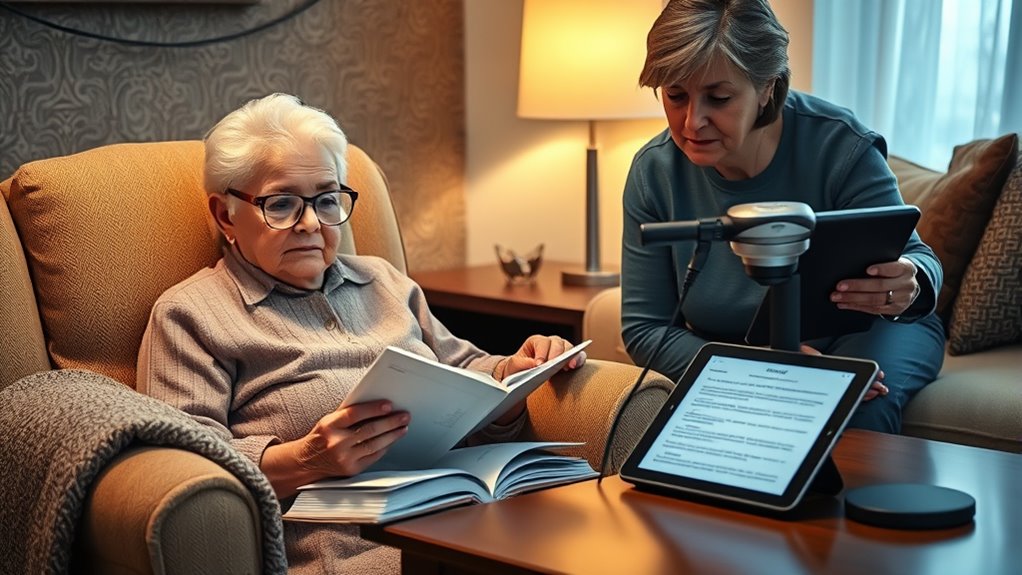
Using assistive devices and technology can considerably enhance independence for someone with macular degeneration. These tools help compensate for vision loss and make daily tasks more manageable. For example, magnifiers enlarge text and images, reducing eye strain. Screen readers and voice-activated devices enable navigation of computers and smartphones without relying on sight. Bright, adjustable lighting improves visibility in different environments. Electronic organizers and large-print labels help keep track of appointments and medications. Additionally, specialized appliances like talking clocks and barcode scanners simplify routines. Incorporating these aids can boost confidence and reduce frustration. Furthermore, adaptive strategies such as organizing frequently used items in consistent places can help maintain routine and reduce confusion. Using assistive technology such as electronic magnifiers or text-to-speech devices can further aid in everyday tasks. Implementing air purification devices can also improve indoor air quality, creating a healthier environment for your loved one. Recognizing the importance of vision enhancement tools can further support their daily activities and overall well-being. Staying informed about assistive devices for vision loss ensures you select the most effective tools for your loved one. With the right devices, your loved one can perform many activities more easily and maintain their independence longer.
Providing Emotional Support and Encouragement

Offering emotional support and encouragement is essential in helping someone with macular degeneration maintain a positive outlook. Your words and actions can boost their confidence and help them feel understood. Listen actively and show patience as they share their feelings or frustrations. Remind them of their strengths and celebrate small successes to foster hope. Avoid minimizing their concerns or offering unsolicited solutions; instead, validate their emotions. Encourage them to stay engaged with hobbies and social activities, which can improve mood and mental well-being. Your consistent support reassures them they’re not alone, making it easier to adapt to changes. Using appropriate tools and accessories can also help them manage daily tasks more comfortably. With empathy and encouragement, you can help your loved one navigate challenges and maintain a resilient, hopeful attitude.
Frequently Asked Questions
How Can I Encourage Independence Without Overwhelming My Loved One?
You want to encourage independence without overwhelming your loved one, so start by offering gentle support and respecting their autonomy. Break tasks into manageable steps, and use clear, simple instructions. Create a safe environment with good lighting and organization. Check in regularly, but allow them to do as much as they can. Your patience and encouragement build confidence, helping them feel empowered without feeling overwhelmed or dependent.
What Are Signs of Worsening Vision That Require Medical Attention?
Your loved one’s vision can change rapidly, almost like a rollercoaster ride. Watch for sudden blurriness, dark or empty areas in their vision, or distorted lines that shouldn’t be. If they experience a sudden loss of sight, or if colors seem faded, these are urgent signs needing medical attention immediately. Promptly seeking help can prevent further deterioration and preserve their remaining vision, so stay vigilant and act quickly.
How Do I Coordinate With Healthcare Providers for Home Modifications?
You should start by sharing your loved one’s needs and concerns with their healthcare providers. Ask for specific recommendations for home modifications that can improve safety and independence. Keep communication open, and follow their guidance closely. Schedule any necessary assessments or consultations, and coordinate with professionals like occupational therapists or home safety specialists. Staying organized and proactive guarantees you implement effective changes tailored to your loved one’s evolving vision needs.
Are There Specific Safety Concerns Unique to Advanced Macular Degeneration?
You should focus on safety concerns unique to advanced macular degeneration by ensuring your loved one’s environment is well-lit and free of obstacles. Encourage the use of high-contrast markings to help them identify objects and steps. Install grab bars in key areas like the bathroom, and consider using tactile or auditory cues. Regularly check for clutter and maintain a consistent, organized layout to prevent falls and promote independence.
How Can I Help My Loved One Maintain Social Connections at Home?
Imagine brightening your loved one’s days with meaningful connections. You can help by encouraging regular virtual chats or safe in-person visits, making sure their environment feels welcoming and accessible. Assist with setting up easy-to-use devices, and create routines that foster social interaction. By staying engaged and attentive, you help them feel connected, supported, and valued, enriching their life with companionship and warmth right at home.
Conclusion
By making these changes, you help create a safe harbor amid the storm of macular degeneration. Your support becomes the steady lighthouse guiding your loved one through each day, illuminating their path with patience, understanding, and adaptions. Together, you turn challenges into manageable waves, ensuring they feel empowered and cared for. Remember, your efforts build a bridge of comfort and independence, helping them navigate this new chapter with confidence and hope.


